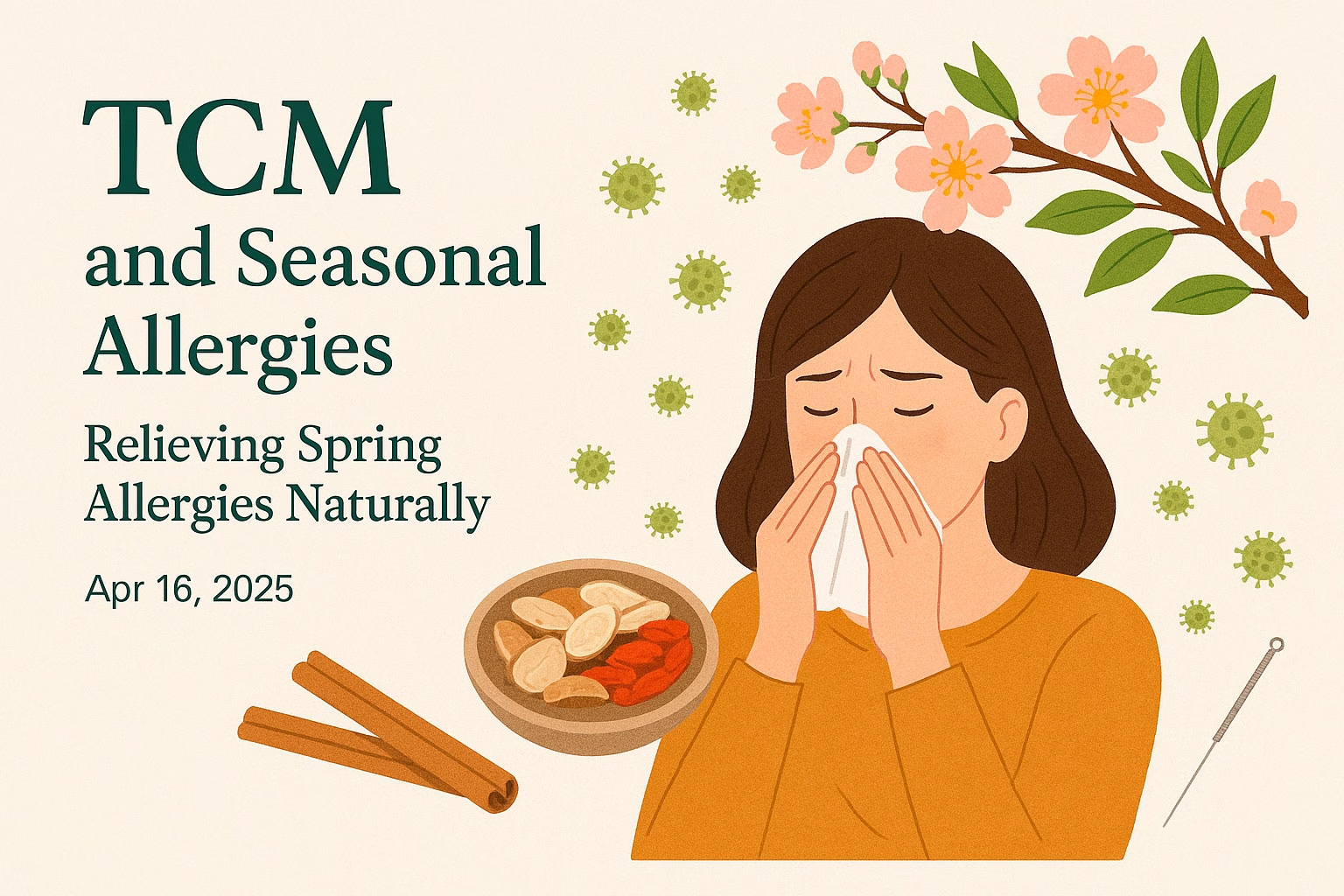🔶 Introduction
As spring arrives, so do the seasonal allergies that affect millions of people worldwide. Pollen, dust, and environmental changes trigger common symptoms such as sneezing, runny nose, itchy eyes, and congestion. While conventional treatments like antihistamines and decongestants provide temporary relief, Traditional Chinese Medicine (TCM) offers a holistic approach that focuses on strengthening the immune system, balancing the body’s internal environment, and alleviating symptoms naturally.
This article explores how TCM treats seasonal allergies by addressing underlying imbalances in Qi, Liver, Spleen, and Lung functions, and provides effective natural remedies for managing symptoms.
🔶 The TCM Approach to Seasonal Allergies
In TCM, allergic reactions are often seen as the body’s immune response to external pathogens (like pollen, dust, and mold) and an indication of internal imbalances. The body’s Wei Qi (defensive Qi) and Lung Qi are directly involved in protecting against external pathogens, and Liver Qi stagnation or Spleen Qi deficiency may weaken the body’s defenses, making it more susceptible to allergies.
1. Wei Qi Deficiency
Wei Qi is responsible for defending the body against external pathogens, such as viruses, bacteria, and allergens. When Wei Qi is weak, it can lead to increased susceptibility to allergic reactions.
- Symptoms of Wei Qi Deficiency: Frequent colds, sweating easily, fatigue, sensitive to environmental changes (like pollen or cold air), and overall weakness.
- TCM Treatment: Strengthening Wei Qi through herbal remedies, diet, and acupuncture is key to preventing allergies.
2. Liver Qi Stagnation
The Liver is responsible for the smooth flow of Qi throughout the body. When Liver Qi is stagnant, it can affect the Lungs, leading to symptoms like irritability, itchy eyes, and sinus congestion — common signs of allergies.
- Symptoms of Liver Qi Stagnation: Emotional stress, irritability, PMS, headaches, and difficulty breathing.
- TCM Treatment: Moving Liver Qi to relieve congestion and calm symptoms.
3. Spleen Qi Deficiency
The Spleen plays a major role in transforming food and fluids into Qi and nourishing the body. When Spleen Qi is weak, it can lead to excess moisture and dampness in the body, making it more prone to allergies.
- Symptoms of Spleen Qi Deficiency: Fatigue, poor appetite, bloating, and feeling sluggish.
- TCM Treatment: Strengthening the Spleen to transform Dampness and prevent the body from becoming a breeding ground for allergens.
4. Lung Qi Deficiency
The Lungs are responsible for protecting the body from external pathogens and regulating the respiratory system. When Lung Qi is weak, allergic symptoms such as sneezing, runny nose, and asthma can occur.
- Symptoms of Lung Qi Deficiency: Weak immunity, chronic respiratory issues, asthma, cough, and frequent colds.
- TCM Treatment: Strengthening the Lungs and promoting Qi circulation to improve the body’s defense system.
🔶 Herbal Remedies for Seasonal Allergies
In TCM, herbal formulas are commonly used to boost the immune system, calm inflammation, and relieve allergy symptoms. Some key herbs include:
✅ Xiao Feng San (Eliminate Wind Powder)
This classic formula is used for Wind-Heat allergies, especially when there is skin itching, rashes, or respiratory congestion.
- Main herbs: Fang Feng, Bai Zhi, Chuan Xiong (help to expel Wind and clear Heat).
✅ Yu Ping Feng San (Jade Windscreen Powder)
This formula is ideal for Wei Qi deficiency and helps strengthen the body’s defenses against external pathogens like pollen, dust, and viruses.
- Main herbs: Huang Qi, Bai Zhu, Fang Feng (to boost Wei Qi and strengthen immunity).
✅ San Ren Tang (Three-Seed Decoction)
This formula treats Damp-Heat related to allergies, particularly when symptoms include nasal congestion, sinus issues, and coughing with thick mucus.
- Main herbs: Xing Ren, Bai Dou Kou, Lian Zi (to clear Dampness and Heat).
✅ Ban Xia Bai Zhu Tian Ma Tang
This formula is beneficial when allergies are accompanied by dizziness or sinus headaches due to Dampness affecting the Liver.
- Main herbs: Ban Xia, Bai Zhu, Tian Ma (to resolve Dampness and move Liver Qi).
🔶 Acupuncture for Allergy Relief
Acupuncture is a highly effective treatment in TCM for managing seasonal allergies. By stimulating specific acupuncture points, it can help regulate Qi flow, reduce inflammation, and support the Lung and Liver meridians.
Key Acupuncture Points for Allergy Relief:
- LI4 (Hegu): This point is used to relieve congestion and boost the immune system.
- LU7 (Lieque): Helps to open the Lungs, relieve sinus issues, and clear nasal congestion.
- ST36 (Zusanli): A powerful point to boost Qi and enhance the defensive energy of the body.
- GV20 (Baihui): Calms the Liver, relieves stress, and alleviates headaches caused by allergies.
- LI20 (Yingxiang): Clears nasal congestion and is commonly used for sinus-related issues.
🔶 Dietary Tips for Managing Spring Allergies
In addition to herbal remedies and acupuncture, diet plays a crucial role in managing seasonal allergies. Foods that help to nourish Qi, reduce inflammation, and clear heat can be beneficial.
| Food Item | TCM Benefit |
|---|---|
| Radishes | Clear Heat and Dampness, relieve congestion. |
| Ginger | Warming, helps to expel Cold and improve circulation. |
| Garlic | Antibacterial and immune-boosting, clears Wind and Heat. |
| Cucumbers | Cooling, help to clear Heat and detoxify. |
| Goji Berries | Nourish Yin and boost immunity. |
| Chrysanthemum tea | Clears Wind-Heat, helps with eye irritation and sneezing. |
🔶 Conclusion
Seasonal allergies can significantly affect quality of life, but Traditional Chinese Medicine offers a comprehensive, natural approach to treating allergies by strengthening the body’s defenses and balancing internal imbalances. Through herbal remedies, acupuncture, dietary adjustments, and lifestyle changes, TCM provides a holistic solution for those looking to relieve allergy symptoms without relying solely on conventional medications.
By aligning with the body’s natural rhythms and supporting its defensive Qi, TCM helps individuals experience a smoother transition into the spring season, free from the discomforts of allergies.


发表回复